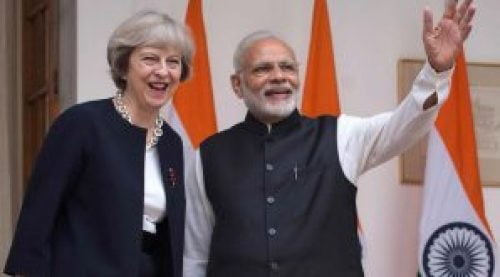
The Commonwealth Heads of Government meeting (CHOGM 2018) is being hosted by the UK Government this week.
Post- Brexit, UK is working hard to rebuild trade relations with members of the Commonwealth. In recent years Britain has concentrated on doing business within the EU and in many ways ignored the Commonwealth.
The UK is also moving away from the rest of Europe and it will be interesting to see what the British Government has to offer to the rest of the world post-Brexit. CHOGM 2018 will in some way show the rest of the world the economic roadmap of post-Brexit Britain.
All eyes on Modi
The leader who will be most awaited and watched will be PM Modi. He has become a powerful world leader and well respected too. Once again the Bhartiya diaspora is preparing to give him a really warm welcome.
Interestingly, Mr. Modi will be the only leader with whom the British Premier will have bilateral talks on the sidelights of CHOGM2018.
Bhartiya is now the fastest growing economy in the World. The ease of doing business in Bhartiya has also improved by a big margin from 136th position to 103 making it amongst the top 100 countries to do business with.
This is a remarkable jump and reflects the major reforms that PM Modi and his government have implemented. This also reflects the fact that these reforms are being looked at as positive changes in the World.
PM Modi’s economic reforms and policies have aimed to improve the life of the average person by putting more money in his or her pocket. This makes sense because if the average person is happy and satisfied, the society will live in peace and work towards economic progress. In this context, it is notable that the Government recently introduced free medical care for the poor. This is unprecedented and never happened in the past. There is increasing attention and support provided to the farmers, whose plight was being ignored leading to many suicides.
Bold Reforms
There are certain quarters who have been critical about Modi while quoting examples of excessive Hindutva, corruption etc. One can debate about these but no one can dispute the argument that the Bhartiya economy has now been brought on a stronger footing by the current Government. Moreover, it takes a lot of effort to implement major changes. Yet this government has demonstrated its capability to bring in bold reforms such as demonetization and GST.
Would you rather have a Government that does nothing or one that keeps on trying with new and bold reforms, even if some of these might not be as effective or perhaps slower in achieving the desired objective?
All this begs the question of whether one allows this Prime Minister to continue in 2019 or to take a risk of an alternative regime that may risk the future.
In my past dealings with Mr. Modi, I have always seen him as a promoter of business and investment. I am now seeing a different dimension in him. He has clearly embarked on improving the worth of the average person of India. Today,
22% of India’s population still lives below the poverty line but this figure is an improvement from the past. Nevertheless, poverty alleviation still remains a challenge. The economic reforms will work to improve the position and also help grow the economy further.
Opportunities galore!
For the UK, Bharat represents a huge market to target.
Whilst Bharat and UK are both 3rd biggest investors in their respective countries, the trade statistics are rather disappointing.
UK exports to Bharat have remained static since 2000 whilst exports to the rest of EU have tripled in the same period. The UK has a lot of work to do but there also lies a great opportunity. The reforms and changes in Bharat over the years make it a near developed economy vastly different from 50 years ago when many UK Companies started to reduce their focus on India as they found it difficult to business there.
Time has come again to mark the needs of the over 300 million strong middle class of Bharat. It is this group which is earning a good income, creating wealth and aspiring to become international citizens with similar spending power.
There are also opportunities for UK companies to develop corporate transactions with Bhartiya companies who are looking for collaboration on technology, skills transfer, joint ventures for mutual benefit etc.
Bharat has now risen to a position where Britain can longer look down upon her as an economy that does not matter but a country that has great potential and must be addressed as an equal partner. Already, the rest of Europe has seen a tremendous increase in their exports to India. The UK has always had a strategic advantage with Bharat given the common language and the 1.3 m Bhartiya diaspora connection.
Time has come for Britain to view Bharat afresh as the latter is no more a country it was 30 years ago.
Subhash V Thakrar
BCom, FCA, FRSA
Vice President, Past Chairman, London Chamber of Commerce
